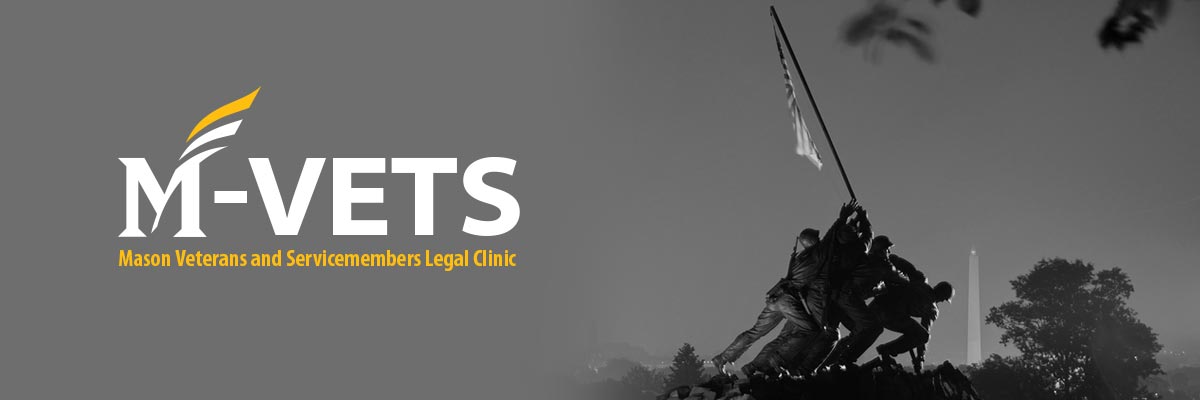Written by Summer 2025 M-VETS Student Advisor Andrew West.
In June 2025, the Supreme Court issued a unanimous decision in Soto v. United States that will result in substantial retroactive payments to over 9,000 combat-disabled veterans.[1] The ruling marked a major legal victory not only for the class of veterans involved, but also for the National Veterans Legal Service Program (NVLSP), a nonprofit pro bono organization that has been fighting for veterans’ rights for more than four decades.[2] This case serves as a powerful example of how legal advocacy can produce life-changing results for vulnerable populations. It is the kind of impact that mirrors the mission and values of the Mason Veterans and Servicemembers Legal Clinic (M-VETS) at George Mason University, where students and supervising attorneys provide free legal representation to military veterans facing complex legal challenges.[3]
At the heart of the case was the Combat-Related Special Compensation (CRSC) statute, codified at 10 U.S.C. § 1413a. CRSC allows veterans with combat-related disabilities to receive tax-free compensation that offsets the retirement pay they lose due to their receipt of VA disability benefits.[4] In practice, CRSC is critical to ensuring that combat-disabled veterans receive the full value of the benefits they earned through their service. However, for years, the Department of the Navy and other branches of the military have limited veterans’ retroactive CRSC payments to just six years from the date of application, citing the Barring Act, 31 U.S.C. § 3702(b).[5]
This six-year gap left many veterans, particularly those unaware of their eligibility or struggling with physical and mental health conditions, without the full compensation they deserved.[6] Simon Soto, a retired Marine Corps veteran, was among them. Represented by NVLSP and pro bono counsel from Sidley Austin LLP, Soto filed suit challenging the application of the Barring Act to CRSC claims.[7] NVLSP argued that the CRSC statute does not impose any retroactivity limitation and therefore supersedes the general limitations of the Barring Act.[8]
After several years of litigation, including a favorable ruling in the district court and a reversal by the U.S. Court of Appeals for the Federal Circuit, the case made its way to the Supreme Court.[9] On June 12, 2025, the Court unanimously held that the Barring Act does not apply to CRSC claims.[10] Writing for the Court, Justice Kagan concluded that Congress had enacted a specific compensation scheme for combat-disabled veterans that was plainly designed to operate independently of the general claims limitation statute.[11] The ruling restores the right of thousands of veterans to receive the full amount of CRSC for every eligible month, not just the six years preceding their application.[12]
The precise financial impact of the decision is not yet known, as neither NVLSP nor the Department of Defense have released a total payout estimate. However, given that the affected class includes over 9,000 veterans and that CRSC payments can range from hundreds to thousands of dollars per month, the aggregate amount could easily reach tens of millions of dollars. For many veterans, this is a long-overdue acknowledgement of the sacrifices they made and a correction of bureaucratic injustice.
The decision in Soto reflects a growing recognition by the judiciary that statutory benefit schemes for veterans must be interpreted in ways that honor their intent and practical function. It reinforces a broader judicial trend favoring liberal construction of veterans’ benefit laws, consistent with the remedial nature of such statutes. While the legislative process is often slow to correct systemic problems, public interest litigation can achieve substantial results. In this case, it ensured that thousands of veterans will finally receive what they earned through service and sacrifice.
The victory would not have been possible without the sustained efforts of NVLSP, whose mission is to ensure that veterans and active-duty servicemembers receive the benefits to which they are entitled.[13] NVLSP’s Lawyers Serving Warriors project provides free legal services to veterans with significant physical and mental health disabilities.[14] In the Soto case, NVLSP worked alongside attorneys from Sidney Austin, who provided high-level litigation support on a pro bono basis.[15] Together, they navigated nearly a decade of litigation through multiple courts, culminating in the Supreme Court’s landmark ruling.[16]
For those of us engaged in clinical legal work, especially in programs like M-VETS, Soto serves as an inspiration. It shows how skilled legal advocacy, even by a small nonprofit, can compel the federal government to change its practices and comply with the law. At M-VETS, students regularly handle discharge upgrades, VA appeals, and other legal matters that, while smaller in scale, can be just as transformative for the individual veteran. The Soto decision is a reminder that whether in a Supreme Court brief or a student-prepared memo, pro bono work on behalf of veterans has the power to deliver justice where it is most urgently needed.
[1] Soto v. United States, 605 U.S. 360, 145 S. Ct. 1677 (2025).
[2] National Veterans Legal Service Program, About NVLSP, https://nvlsp.org (last visited Aug. 9, 2025).
[3] Mason Veterans and Servicemembers Legal Clinic, About M-VETS, https://mvets.law.gmu.edu (last visited Aug. 9, 2025).
[4] 10 U.S.C. § 1413a (2002).
[5] 31 U.S.C. § 3702(b) (1982).
[6] See NVLSP, Supreme Court Unanimously Rules for 9,000 Combat-Disabled Veterans to Receive Full Retroactive Combat-Related Special Compensation (June 12, 2025), https://nvlsp.org/supreme-court-unanimously-rules-for-9000-combat-disabled-veterans-to-receive-full-retroactive-combat-related-special-compensation.
[7] Id.
[8] Id.
[9] Sidley Austin LLP, Sidley Wins Major Pro Bono Supreme Court Victory on Behalf of Combat-Wounded Veterans (June 12, 2025), https://www.sidley.com/en/newslanding/newsannouncements/2025/06/sidley-wins-major-pro-bono-supreme-court-victory-on-behalf-of-combat-wounded-veterans.
[10] Soto, at 361.
[11] Id. at 370.
[12] Id. at 362.
[13] NVLSP, supra note 6.
[14] Id.
[15] Sidley Austin LLP, supra note 9.
[16] Id.
